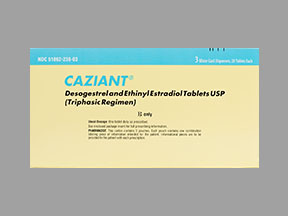Caziant is a limited distribution medication.

Caziant Coupons & Savings Card – Discount Prices from $14.66
My prescription
Edit
0.1/0.125/0.15-0.025 MG, Caziant (28 Tablets)
Select pharmacy

CVS
$34.74
COUPON PRICE
Walgreens
$14.66
COUPON PRICE
Albertsons
$18.70
COUPON PRICE
Walmart
$21.60
COUPON PRICECaziant savings card
Show this card to your pharmacist
Walgreens
$14.66
BIN
ID
PCN
GRP
015995
LHKPY244257
GDC
DR33
Powered by
Price history for Caziant
28 Tablets, 0.1/0.125/0.15-0.025 MG
Average retail price for Caziant
Average SaveHealth price for Caziant
Our price history data is based on aggregated prescription data collected from participating pharmacies in America. Our prescription data updates daily to reflect the latest price changes. If you notice a missing data point, it means there wasn't sufficient data available to generate a monetary value for that date.
*Retail prices are based on pharmacy claims data, and may not be accurate when we don't have enough claims.
Caziant dosage forms
Dosage Quantity Price from Per unit 0.1/0.125/0.15-0.025 MG 28 Tablets $18.70 $0.67 0.1/0.125/0.15-0.025 MG 84 Tablets $41.09 $0.49
| Dosage | Quantity | Price from | Per unit |
|---|---|---|---|
| 0.1/0.125/0.15-0.025 MG | 28 Tablets | $18.70 | $0.67 |
| 0.1/0.125/0.15-0.025 MG | 84 Tablets | $41.09 | $0.49 |
What are the side effects of Caziant?
Caziant, a combination oral contraceptive, may cause side effects such as nausea, vomiting, headache, bloating, breast tenderness, and changes in weight or appetite. Some individuals may also experience mood changes, spotting between periods, or changes in menstrual flow. Serious side effects, though less common, can include blood clots, high blood pressure, and liver problems. It is important for individuals to consult their healthcare provider if they experience any severe or persistent side effects.
Using the SaveHealth discount card, what is the price of Caziant without insurance?
Using the SaveHealth discount card, the price of Caziant without insurance is $14.66.
What is the price of Caziant at CVS?
The price of Caziant at CVS is $34.74.
What is the price of Caziant at Walgreens?
The price of Caziant at Walgreens is $14.66.
What is the price of Caziant at Walmart?
The price of Caziant at Walmart is $21.60.
